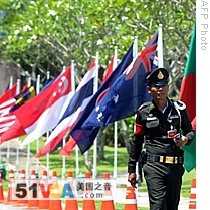Bangkok
20 July 2009
Security is tight on Thailand's resort island of Phuket this week as foreign ministers from 25 countries gather for meetings of the Association of Southeast Asian Nations and their dialogue partners. Terrorism will be fresh on the minds of delegates after twin hotel bombings in Jakarta Friday killed at least nine people. Relations with Burma and North Korea will also top discussions.
 |
| A Thai soldier patrols past the flags of Association of Southeast Asian Nations (ASEAN) prior the 42nd ASEAN ministerial meeting in Phuket island, 19 Jul 2009 |
Thailand wants to prevent the embarrassing scenes in April when anti-government protesters stormed an ASEAN summit, forcing its cancellation.
Aside from the massive security force in Phuket, Thailand has invoked an internal security act and outlawed protests on the resort island.
Panitan Wattanayagorn is a government spokesman. He says the security measures are necessary for the safety of those attending the conference.
"Thai government is very confident that security and stability will be ensured," he said. "We have a lot of very good cooperation form the organizations and the people on the ground as well as from various agencies, including civil society organizations."
The meetings bring together foreign ministers from ASEAN's 10 members and 15 regional players, including Australia, China, and the United States.
Counter-terrorism will likely be high on the agenda following deadly hotel bombings in the Indonesian capital, Jakarta.
Rohan Gunaratna heads the counter-terrorism research center at Nanyang Technology University in Singapore. He says the attack was the work of Jemaah Islamiyah, the terrorist group responsible for a series of deadly bombings in Indonesia earlier this decade. J.I. has with links to al Qaida, and its members are suspected of training potential terrorists in the Philippines.
"The attacks very clearly demonstrate that a terrorist threat in Southeast Asia is very much alive, and particularly in Indonesia, the Jemaah Islamiyah organization still presents a very significant threat," said Gunaratna.
North Korea's nuclear program is also expected to be discussed at the meetings, and Thailand hopes to arrange an informal round of disarmament talks with North Korea, South Korea, China, Japan, Russia and the U.S.
The ministers will also discuss dealings ASEAN member Burma, which has been strengthening its relationship and military ties with North Korea. Many Western nations, including the United States, have imposed sanctions on Burma for its human rights abuses.
Debbie Stothard is coordinator for the Alternative ASEAN Network on Burma, a regional rights group. She says the regional forum should look seriously at the danger that Burma's military government poses not only to people in Burma but also the region.
"For years now the region has been dealing with transnational crime, mass movements of millions of people from Burma, with disease pandemics because of the Burmese military regime," said Stothard. "But, now we also have to consider the growing cooperation between the Burmese junta and North Korea."
Stothard says ASEAN and its dialogue partners should be concerned by reports that Burma may be trying to obtain North Korean weapons and missile technology.
Burma's military government is already under international pressure to release political prisoners, including democracy leader Aung San Suu Kyi, and make democratic reforms.
Dave Mathieson is a Burma researcher for Human Rights Watch in Thailand. He says the meetings are a good opportunity for ASEAN to take real action on Burma.
"I think now is a very good time for the member states of ASEAN to start re-thinking their flawed engagement strategies with the military government and to actually look beyond their own narrow self-interests of trade and energy deals that most ASEAN states are doing, Thailand, Malaysia, and Singapore especially," said Mathieson.
At the meetings, ASEAN foreign ministers will work to finalize the region's first human rights body, which they say will serve as a platform to discuss rights issues such as Burma.
But, ASEAN officials acknowledge the rights body will have no power to punish state violators without that member state's agreement.
Christopher Roberts is a lecturer in international relations and Asian studies at the University of Canberra in Australia. He says Burma is not the only ASEAN member that is happy with a weak human rights body.
"Countries like Laos, Vietnam, and increasingly Cambodia sit there and look at developments concerning Burma and actually worry about whether if a strong stand is made against Burma, could the same stand be applied in the future toward their own government. Burma is not the only one with human rights problems within the association," said Roberts.
Roberts says at the Phuket meetings, economic cooperation is likely to take up most of the discussion time as all governments are dealing with the financial crisis.
Ministers will draft work plans for disaster relief efforts as well as fighting terrorism, disease pandemics, and transnational crime.